- Home
- Darrell Maloney
It Can't Be Her
It Can't Be Her Read online
Countdown
to Armageddon
Book 12:
IT CAN’T
BE HER
By Darrell Maloney
This is a work of fiction. All persons depicted in this book are fictional characters. Any resemblance to any real person, living or dead, is purely coincidental.
Copyright 2018 by Darrell Maloney
This book is dedicated to:
David and Marilyn Stokes.
You’ve been with me on this journey since the very beginning. You’ve been trusted advisors and the very best friends a guy could have.
Thank you both for everything.
THE STORY THUS FAR…
Sara was but a teen the first time the power went out.
A senior in high school from a troubled home.
She’d been abused by her step-father for years. But in her mind her mother was equally to blame. For part of a mother’s job is to protect her children from harm, not to look the other way and let it happen.
Sara had no siblings to turn to. Her life was a series of humiliating and agonizing events.
A life of secrets and lies which she suffered alone.
Her one and only respite from the abuse was the time she spent at school or with her boyfriend Jordan.
Jordan was everything her step-father wasn’t. Stable, kind and protective.
If he’d known what was going on behind closed doors at Sara’s house he’d have gotten her out.
And he likely would have gone to jail for assault or worse. For he wasn’t the type of man who’d let such transgressions go unpunished.
On the day storms on the face of the sun sent electromagnetic pulses streaming toward the earth the young couple had been in school.
Jordan’s father Scott was a prepper. Jordan half suspected his dad was a crackpot. And half respected his commitment to thinking outside the box.
“I know what’s happened,” he told Sara. “You’ve got to go home to be with your family. I’ll contact you when I can.”
That wasn’t good enough for Sara.
She’d been looking for a way to break free from her parents for quite some time.
This was her one chance.
“My parents are out of town,” she lied. “If I go home I’ll be at the mercy of looters and marauders.”
Jordan had strict orders to return home immediately should the lights ever go out without explanation.
But he couldn’t abandon the woman he loved.
It was the only time in his seventeen years he openly defied his father’s instructions.
But Scott Harter was a reasonable man. When he heard of the circumstances he agreed that Jordan had made the right decision.
Sara told Scott she’d left a note on her pillow for her parents to find upon their return. A note which told them of Sara’s whereabouts, and a request to retrieve her when they came home.
Jordan saw her place the note. But he didn’t know the “note” was but a blank piece of paper. A ruse, to finally rid Sara of the bond with two parents she hated and despised.
When Scott’s family left the city of San Antonio for a safer compound in the mountains near Kerrville they had no choice but to take Sara with them.
It wasn’t until they settled there that Sara finally came clean.
She confessed her ruse to Linda, Scott’s former wife and Jordan’s mother.
“Please don’t send me back,” Sara begged. “They gave up the right to be my parents a long time ago.”
“That may be so,” Scott maintained. “But they have a right to know you’re safe and with a new family. A family that will cherish you and care for you.”
Sara agreed to go back, but not to stay.
She’d go back to tell her parents they’d lost her. And to go straight to hell.
Instead, she got her own comeuppance when she learned her mother Stacy had been abused herself.
And like many abused mothers, she lacked the courage or the strength to protect herself from the abuse, much less provide protection for her daughter.
Sara’s leaving finally gave Stacy the courage to stand up to Glen once and for all and she shot him dead.
Then she went looking for her daughter.
Sara was escorted to San Antonio by a friend and neighbor who’d joined Scott and his family at the Junction compound.
It was a dangerous new world. One in which the good guys had to band together for mutual protection. For the nights were thick with marauders who took what they wanted by way of a gun.
Tom Haskins was a rancher by trade and one of the toughest men Sara had ever met.
They’d bonded immediately and became much more than just friends.
Sara was like the daughter Tom never had. She was a tiny spit of a girl but she had spunk.
Tom reminded Sara of her favorite grandfather. The one who’d taught her to fish and hunt and ride a horse… and who died long before he could watch her grow up into the fine young lady she was.
Sara had an epiphany. She now saw her mother not as complicit in her abuse, but rather as another victim.
It pained her to know her mother was out there… somewhere, searching for her.
“I’ve got to go find her,” she told Tom. “I have to give her the safe home she was unable to give to me.”
In their search for Stacy Sara and Tom happened upon a makeshift orphanage at an abandoned library in south San Antonio. There Sara fell for a precocious girl of eight named Millicent.
And something about the child bugged young Sara, even as they left San Antonio and struck out for Castroville thirty miles to the west.
In Castroville they found Stacy, taken prisoner by very bad men. She’d jumped from the frying pan into the fire, and instead of being abused by one man she was being brutalized by several.
Tom had Sara stay back and attempted to rescue her on his own, but was brutally beaten for his efforts.
A Texas Ranger named Randy, who’d teamed up with the pair outside of Castroville, took out several of the men and Sara herself fired the final shots which freed her mother.
It was a tearful reunion. Mother and daughter were together again, and free of abusive men for the first time in years.
Ranger Randy set out in search of more lives to save and Stacy and Sara nursed Tom back to health.
They set out together for a hundred-plus mile trip back to Junction, with a stop along the way to collect Millicent.
Tom was unsure of Sara’s plan, and said so.
“Do you think it’s a wise idea to just adopt a child without asking Jordan? Or Scott either, for that matter?”
“Jordan won’t mind. You’ll have to trust me on this. I know him a lot better than you do.”
“No doubt you do,” Tom replied. “But what about Scott and Becky? Don’t they have a right to help decide who they take in under their roof? After all, you and I are technically guests there ourselves.”
“You said yourself there are plenty of vacant houses in Junction and Kerrville, Tom. If anyone objects, Jordan and I will just take Millicent and move into one of them.”
The spunky nature which attracted Tom to Sara prevented them from seeing eye to eye on the matter. Try as he might, he couldn’t change her mind.
Neither could Stacy.
Neither understood the bond Sara had formed with young Millicent in the brief time they’d spent together at the orphanage.
Neither of them understood that in young Millicent Sara saw herself.
And she’d do whatever she could to prevent Millicent from falling into the same situation Sara had suffered through for years.
In the end the two of them… Tom and Stacy… relented and let Sara have her way. If she could convince the people at the adoption agenc
y she was a suitable parent for Millicent they’d take the girl back to Junction and give her a new home.
As with so many things in life, though, there was a hitch.
Millicent was tied by the hip to a young boy named Charles.
It turned out Millicent would have been adopted long before, were it not for her refusal to leave the orphanage without her best friend.
It seemed the pair were a package deal.
“Charles and me, we look out for each other,” Millicent explained. “I’m all he’s got and he’s all I got. I can’t just leave him here where he’d have nobody on his side.”
“Several people have considered a joint adoption,” the agency told Sara. “But Charles, unfortunately, is a handful. He’s sullen and moody and lashes out, both physically and verbally.
“He’s been horribly abused and has a lot of demons only he can see.”
Spunky Sara didn’t care.
“Whatever damage they’ve done to him can be cured if he’s given love and patience. I won’t abandon him here where he can be thrown back to the wolves.”
Charles was, as promised, a handful.
But he had his good qualities as well.
One was an intense desire to prove his worth, and on the way back to Junction he killed a bad man who was intent on raping Sara.
To Tom and Stacy he proved himself capable.
Of killing.
To Sara, though, she saw a boy struggling desperately to be a man, and a protector of those he considered his friends.
It made her even more determined to make him her son.
Sara needn’t have worried about Charles finding a home at the Junction compound. He was welcomed with open arms.
The problem was, all the love he was shown couldn’t chase away his demons.
He continued to be moody and resistant to their efforts to be kind to him.
He still felt like the proverbial red-headed step child.
And he still wanted, more than anything else, to find a way to contribute.
The second wave of EMPs took everybody by surprise.
It shouldn’t have. For practically everything in the universe runs in some type of cycle or on some type of galactic schedule.
And on earth, weather systems sometimes create other weather systems. Tornados and hurricanes sometimes spawn other tornados and hurricanes.
Earthquakes almost always have aftershocks, and many times those aftershocks are as powerful as the quake which preceded them.
So why, really, wouldn’t a blast of EMPs from the surface of the sun be followed up by a second round?
Nearly everyone was caught flat-footed. Electronics which were so carefully protected from the first pulses by preppers were generally destroyed in the second wave.
Scott was luckier than most.
Many of his working electronics happened to be stored in a two-car garage he’d modified into a Faraday barn.
And the drive-through door just happened to be closed when the second wave hit.
Not to protect the equipment from the EMPs, but rather to keep it dry during a coming rainstorm.
But the effects were the same.
The closed metal door completed a circuit around the equipment and kept the pulses away from it.
A lot of other equipment was unprotected and lost, though.
The group now had diminished capability. For the first time they were cooking their food and heating their water by burning wood.
The one bright spot was that Charles finally found a way to prove his worth.
It turned out the troubled young man had a knack for repairing electronics.
Moreover, his small hands were strong and steady. They were perfect for doing the fine soldering and tiny parts removal needed to repair half-destroyed circuit cards.
And thanks to Charles’ prowess he was well on his way to repairing the compound’s security systems and many of its comfort items.
Things were looking up for the group of people at Junction.
Tom returned to his job as Sheriff of Kerr County, which included not only the Junction compound but the city of Kerrville as well.
Sara talked him into deputizing her.
She wanted to do her part to help out, she said. And she had an ulterior motive as well.
The city of Kerrville, unable to pay its employees in a world where the dollar no longer existed, paid instead with land credits.
The credits could be used to purchase abandoned and seized property.
Sara and Jordan saw it as an opportunity to purchase a section of land and a pre-existing home for pennies on the dollar after only a couple of years’ work.
And neither considered Sara not up to the job. On the arduous trip to San Antonio and Castroville she’d proved her mettle.
She was as tough as any man.
She’d soon be given a chance to prove it.
A sadistic killer was on the loose in Kerrville. He’d brutally murdered two women, and was in the mood to kill again.
By chance, Sara happened to drive past the man and they locked eyes.
By the time she found his second victim and went back in search of the suspect, he was long gone.
His face was burned into Sara’s mind.
In the killer’s mind, she therefore had to be his next victim.
In his mind she was the only one who could identify him.
For four nights Jeff Barnett stalked young Sara as she and the rest of the Kerr County Sheriff’s Office tried to track him down.
On the night he finally made his move he was able to disable her truck on a lonely stretch of highway.
And he took her without so much as a whimper.
By the time Sara was reported missing she was tied to a bed miles from the abduction site in an abandoned ranch house.
Now a second search was on.
This one was for Sara.
And although the logical conclusion was that the killer was connected with her disappearance, no one wanted to believe it to be true.
For they’d seen the way he tortured and dismembered his previous victim, while she was still alive.
And no one wanted Sara to suffer the same fate.
When we last left Junction, help was coming from San Antonio in the guise of Scott’s good friend John Castro.
It wouldn’t be enough.
And now, Book 12 of the series,
IT CAN’T BE HER
-1-
Outside of San Antonio, a middle-aged woman named Tillie Burgess walks alongside her German Shepherd Hero.
Hero’s ears perk up and he whimpers. He can hear a rumble in the distance long before Tillie does and is confused by it.
He stops short and scans the horizon ahead. His ears twitch.
He cries and looks to Tillie for explanation.
Tillie leans over him and asks, “What is it, boy? What’s the matter?”
He looks at her, partly for answers, partly for consolation.
He’s suddenly skittish.
It’s a feeling the big dog doesn’t experience often, for he’s a brave and loyal friend to Tillie.
But not this time. This time he’s frightened.
This time he wants to hide until the rumble goes past.
He feels a sense of urgency, for the vibrations are getting stronger, the rumble louder.
“Hero, what’s the matter?”
He pulls away from her and leads the way into a stand of nearby trees.
Tillie hasn’t a clue what’s going on; what he’s trying to tell her.
But she trusts him.
And she follows him.
It is from there, from the cover of a small patch of undeveloped woods along Interstate Highway 37, that the source of the rumble finally comes into view.
On the crest of a hill, half a mile away, a desert-brown Humvee suddenly appears.
It’s followed by another, and then another still.
A typical United States Army overland convoy, two hundred vehicles str
ong, a hundred and twenty feet of space between each of them.
The convoy snakes its way around abandoned vehicles and other obstacles blocking the roadway, taking care to avoid debris which has collected here and there over the previous two-plus years.
It’s mostly Humvees, painted desert brown with an inverted V painted upon each door as well as the hood and rear hatch.
Here and there are armored personnel carriers and troop carriers: deuce and a half trucks painted in a similar manner.
The Army has come calling.
Not to do battle, for wars between nations have pretty much become obsolete.
Many nations have simply disappeared, having closed their governments and gone home to be with their families.
Those which are still operational are greatly diminished.
And none have any spoils worth fighting for.
The United States government wants to know which of its citizens have survived.
And where they are.
It’s seen as the essential first step in reconstituting the once-greatest nation.
It cannot help its people recover if it doesn’t know where to find them and doesn’t know what they need.
Few knew that the military knew ahead of time the EMPs were coming.
No, they didn’t know when. And they didn’t know the extent of damage they’d incur.
But the chiefs of staff of the military services knew at sometime, in their lifetimes or well beyond, the sun would wreak havoc upon the earth.
It turned out government scientists have known for decades it was only a matter of time before the blackout came. They knew it was inevitable.
They also knew such news wouldn’t be received well among American citizens. Many would scoff at the idea. Many others would demand the government do something to prevent it.
And there was nothing the government could do.
So they kept it to themselves.
Oh, that wasn’t to say they didn’t make preparations to protect their own equipment.
They’d stored the strategic oil reserves in salt caverns outside of Bryan Mound, Texas for many years.

 A Perilous Journey
A Perilous Journey The Yellowstone Event: Book 6: The Aftermath
The Yellowstone Event: Book 6: The Aftermath Eden Bound
Eden Bound Without Warning
Without Warning Everything Has Changed
Everything Has Changed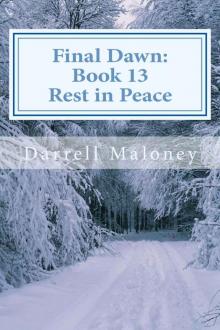 Rest in Peace
Rest in Peace This Changes Everything
This Changes Everything The Final Chapter
The Final Chapter It Can't Be Her
It Can't Be Her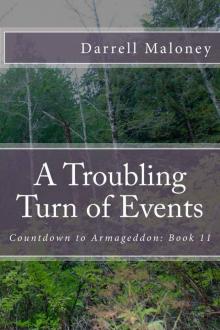 A Troubling Turn of Events
A Troubling Turn of Events The Blockade
The Blockade A Tearful Reunion
A Tearful Reunion Countdown to Armageddon
Countdown to Armageddon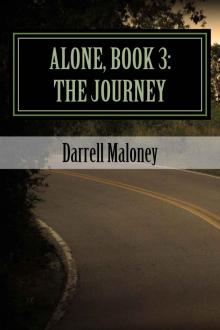 Alone, Book 3: The Journey
Alone, Book 3: The Journey The Army Comes Calling
The Army Comes Calling The Grim Reaper Comes Calling
The Grim Reaper Comes Calling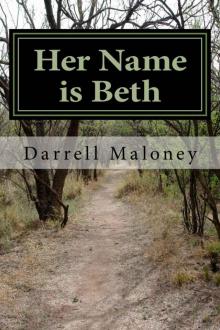 Her Name is Beth: Alone: Book 5
Her Name is Beth: Alone: Book 5 Red: The Adventure Begins
Red: The Adventure Begins Rise From The Ashes: The Rebirth of San Antonio (Countdown to Armageddon Book 3)
Rise From The Ashes: The Rebirth of San Antonio (Countdown to Armageddon Book 3) An Unkind Winter (Alone Book 2)
An Unkind Winter (Alone Book 2)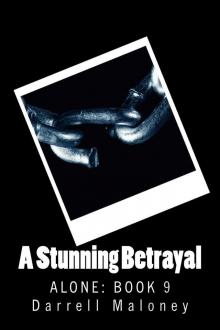 A Stunning Betrayal: Alone: Book 9
A Stunning Betrayal: Alone: Book 9 A Whole New World: Ranger: Book 2
A Whole New World: Ranger: Book 2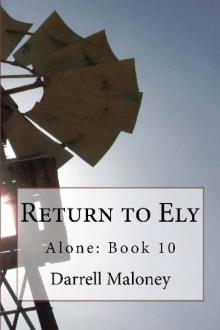 Return To Ely
Return To Ely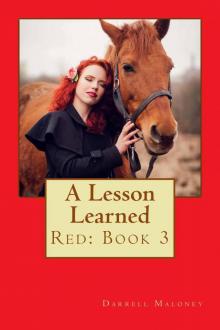 A Lesson Learned: Red: Book 3
A Lesson Learned: Red: Book 3 The Homecoming: Countdown to Armageddon: Book 5
The Homecoming: Countdown to Armageddon: Book 5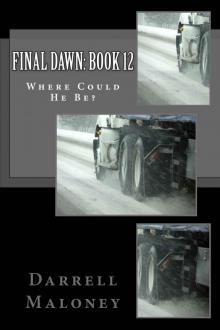 Final Dawn: Book 12: Where Could He Be?
Final Dawn: Book 12: Where Could He Be? An Acquired Taste
An Acquired Taste On Desert Sands: Alone: Book 6
On Desert Sands: Alone: Book 6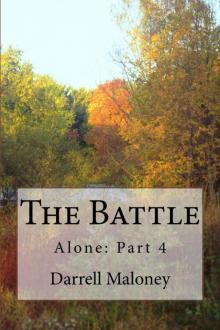 The Battle: Alone: Book 4
The Battle: Alone: Book 4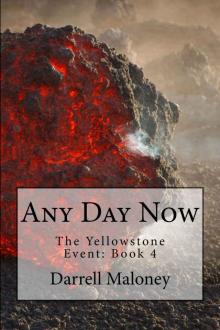 Any Day Now
Any Day Now Too Tough To Tame: Red: Book 2
Too Tough To Tame: Red: Book 2 No Help From Austin: Red: Book 5
No Help From Austin: Red: Book 5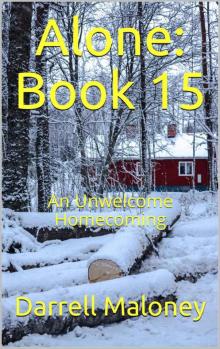 An Unwelcome Homecoming
An Unwelcome Homecoming A New Start: Final Dawn: Book 9 (Volume 9)
A New Start: Final Dawn: Book 9 (Volume 9)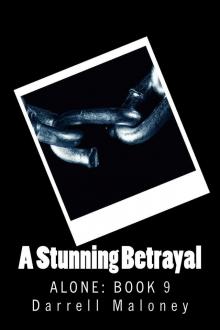 A Stunning Betrayal
A Stunning Betrayal An Undeclared War (Countdown to Armageddon Book 4)
An Undeclared War (Countdown to Armageddon Book 4)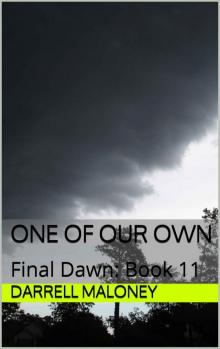 One of Our Own: Final Dawn: Book 11
One of Our Own: Final Dawn: Book 11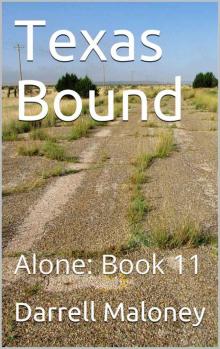 Texas Bound: Alone: Book 11
Texas Bound: Alone: Book 11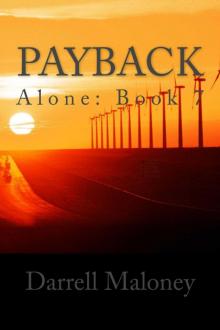 Payback: Alone: Book 7
Payback: Alone: Book 7 The Quest: Countdown to Armageddon: Book 6
The Quest: Countdown to Armageddon: Book 6 The Siege
The Siege The Yellowstone Event: Book 1: Fire in the Sky
The Yellowstone Event: Book 1: Fire in the Sky Return to Blanco (Red Book 4)
Return to Blanco (Red Book 4) The Search
The Search AFTER THE DUST SETTLED (Countdown to Armageddon Book 2)
AFTER THE DUST SETTLED (Countdown to Armageddon Book 2) Death Comes Calling (Ranger Book 3)
Death Comes Calling (Ranger Book 3)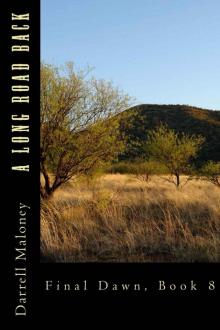 A Long Road Back: Final Dawn: Book 8
A Long Road Back: Final Dawn: Book 8